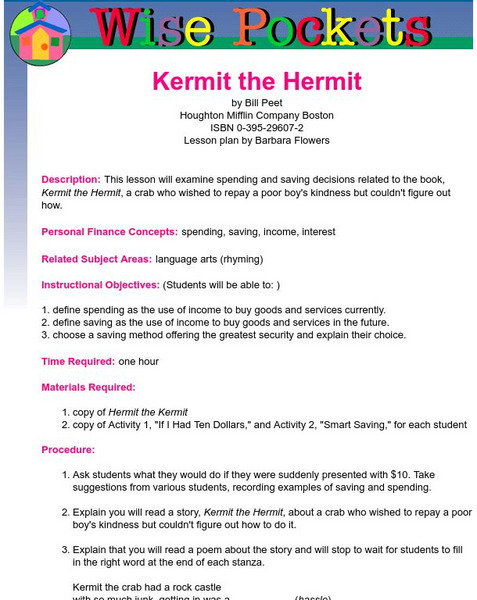Practical Money Skills
Practical Money Skills: Lesson One: Making Spending Decisions
The goal of this lesson is to introduce structured spending decisions to assist young children in making choices and to recognize that money comes in limited amounts.
Practical Money Skills
Practical Money Skills: Lesson Two: Spending Plans
This instructional activity introduces children to the concept of dividing their money into categories, namely "save," "spend," and "share" and presents activities that will help them understand that money is limited in quantity and must...
Khan Academy
Khan Academy: Lesson Summary: Definition, Measurement, and Functions of Money
This information is intended for AP Macroeconomics students or for those taking college macroeconomics. This lesson reviews key terms and calculations related to the definition, measurement, and functions of money. Topics include the...
Teachnology
Teachnology: Math Lesson Plans
Great lesson plans covering a wide-range of math-related subjects.
Smithsonian Institution
Smithsonian Learning Lab: What Shape Is Money? Money Doesn't Have to Be Round or Rectangular
Pigs, rice, nuts, teeth, eggs, feathers - these are all types of currency! This lesson discusses different types of objects that can be used as currency and students will decide what qualities make an effective currency. Included are...
Council for Economic Education
Econ Ed Link: Do I Look Like I'm Made of Money?
One of the most common replies given by parents when their children ask for money is "Do I look like I'm made of Money?" This lesson is designed to educate learners about the need for money as a generally accepted medium of exchange. The...
Federal Reserve Bank
Federal Reserve Bank of Atlanta: Building Block Barter Lesson
Lesson plan for 3 - 5 graders about the advantages of using money instead of bartering.
Practical Money Skills
Practical Money Skills: Lessons: Pre K Grade2
Four lessons on basic money skills for young learners cover topics such as identifying money, spending money, and earning money.
Practical Money Skills
Practical Money Skills for Life: Lesson Plans
A series of financial literacy lesson plans broken out by grade range for grades from Pre-K through college, with an additional set of lessons created for students with special needs.
Scholastic
Scholastic: Adventures in Math: Lesson 3: Money in Our Community
Lesson focuses on how and why money circulated within our community. Being able to discern the difference between things we need and things we want is one of the foundational concepts for using money wisely. Goods and services are things...
Scholastic
Scholastic: Adventures in Math: Lesson 1: Money Matters
The process of earning money is the cornerstone of financial literacy. For this lesson, young scholars will identify key terms associated with earning money, explore ideas for earning money now, and evaluate various career options as...
Better Lesson
Better Lesson: Hundreds, Tens, Ones Are Coins Too
Second graders will extend their understanding of hundreds, tens and ones using dollars, dimes and pennies as another way to express groups of 100, 10 and 1.
TED Talks
Ted: Ted Ed: The Time Value of Money
We've all heard the phrase "Time is money." But what do these two things actually have to do with one another? German Nande explains the math behind interest rates, revealing the equation that will allow you to calculate the future value...
CNN
Cnn Money: Body Language Savvy
What one gesture means in one part of the world may be totally different in another part! Here's some good advice on what to watch out for when traveling as well as a lesson on the different cultures of the world.
Better Lesson
Better Lesson: Unit 3 Assessment
It is important to assess students periodically to plan for future lessons to meet student needs.
Scholastic
Scholastic: Adventures in Math: Lesson 1: Saving Money for Your Future
Tips for learning the value of saving money to achieve your financial goals.
Illustrative Mathematics
Illustrative Mathematics: 2.nbt Saving Money 1
In this lesson plan students use strategies based on place value to add and subtract within 100.
Council for Economic Education
Econ Ed Link: Where Did All the Money Go? The Great Depression Mystery
Use this lesson plan to have students investigate how the American economy went from boom to bust in the 1920s. Find the resources needed for the lesson as well as important discussion questions for individual and class consideration.
Other
Finra Investor Education Foundation: Introduction to Earning Interest 11 & 12
Students will know and be able to use the formula for calculating compound interest and understand the effect of compounding on savings in this lesson.
Smithsonian Institution
Smithsonian Education: What's It Worth? Thinking About Weights and Measures
A activity on the system of currency used by the Akan people of Ghana and how it compares to systems used today.
University of Missouri
University of Missouri St. Louis:wise Pockets: Kermit the Hermit
This is an elementary level lesson that deals with spending, saving, income, and interest. Requires the book Kermit the Hermit by Bill Peet. Includes detailed lesson plan along with procedures and activities.
Federal Reserve Bank
Federal Reserve Bank of Philadelphia: Why Money? [Pdf]
Students learn about barter, and the benefits of using money, as they participate in this trading simulation.
Other
Money Management International: The Berenstain Bears' Trouble With Money
A lesson plan featuring the Berenstain Bears that introduces the concepts of spending, goods, services, income, saving, and interest.
PBS
Pbs: The Fall of the Dollar (Lesson Plan)
A lesson that helps student understand how exchange rates are determined and how the value of a nation's currency is connected to its international trade. Students use an article from a time when the U.S. dollar was declining in relation...
Other popular searches
- Money Lessons Giving Change
- Counting Money Lessons
- Canadian Money Lessons
- Second Grade Money Lessons
- 2nd Grade Money Lessons
- Australian Money Lessons
- Shopping Money Lessons
- Math Money Lessons
- Money Lessons Elementary
- Fun Money Lessons
- Counting Money Math Lessons
- Adding Money Amounts Lessons













![Federal Reserve Bank of Philadelphia: Why Money? [Pdf] Lesson Plan Federal Reserve Bank of Philadelphia: Why Money? [Pdf] Lesson Plan](http://content.lessonplanet.com/resources/thumbnails/409976/large/bwluav9tywdpy2symdiwmduymc0xmdm5ny0xdnbua3j3lmpwzw.jpg?1589982798)

